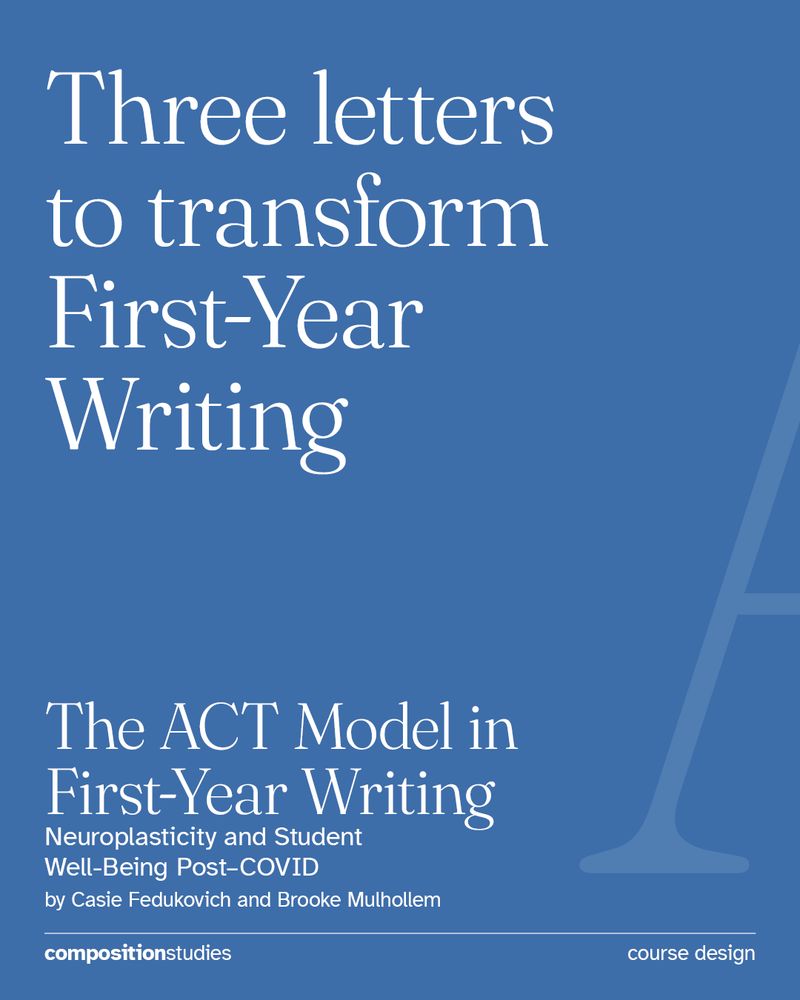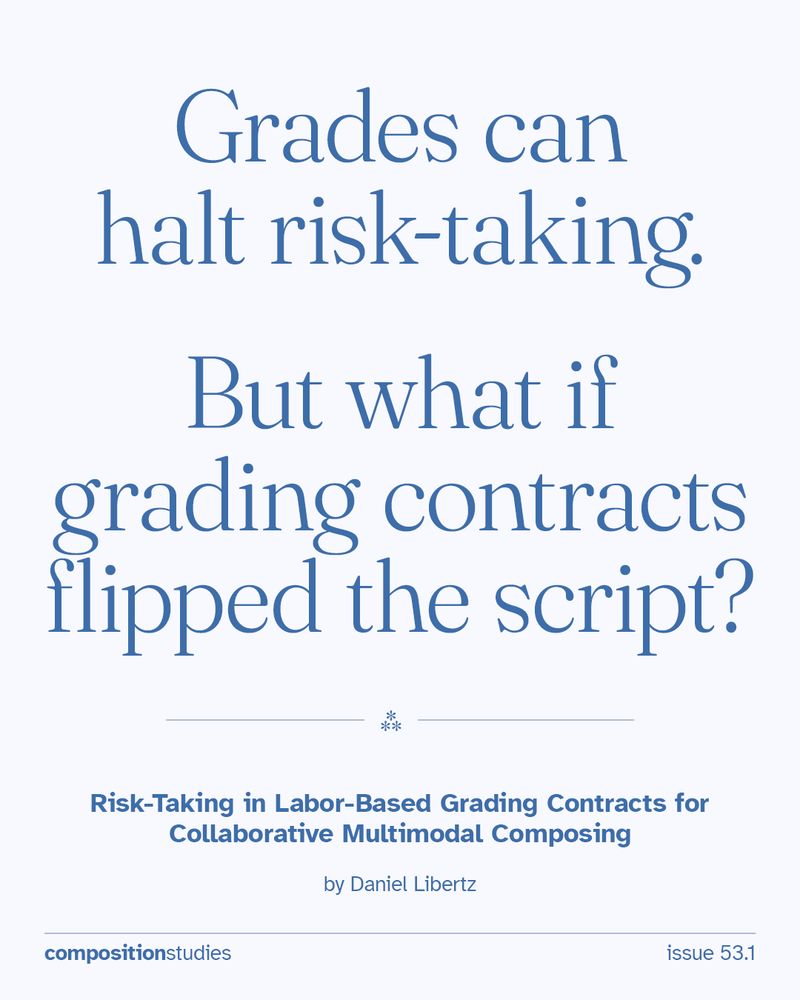
Composition Studies 53.1 is now live.
Featuring essays on grading contracts, conference futures, sustainable teaching, and editorial care.
Read it here: compstudiesjournal.com/current-issu...
#cs531 #compositionstudies #rhetcomp #writingstudies
For years, conferences have meant flights, hotels, and steep fees. What if our most inclusive, connected professional spaces are intentionally online?
🔗 bit.ly/wwa-living

For years, conferences have meant flights, hotels, and steep fees. What if our most inclusive, connected professional spaces are intentionally online?
🔗 bit.ly/wwa-living
Read the full review: bit.ly/review-sanct...

Read the full review: bit.ly/review-sanct...
Joanne Baird Giordano & Charissa Che trace how TYCA National became an open-access advocacy space for two-year college educators.
🔗 bit.ly/WWA_TYCA

Joanne Baird Giordano & Charissa Che trace how TYCA National became an open-access advocacy space for two-year college educators.
🔗 bit.ly/WWA_TYCA
Full review: bit.ly/review-black...

Full review: bit.ly/review-black...
In their new Composition Studies article, Kofi J. Adisa and Frankie Condon imagine a future for academic gatherings that’s more accessible, inclusive, and human. 🧵
🔗 Read here: bit.ly/www-future

In their new Composition Studies article, Kofi J. Adisa and Frankie Condon imagine a future for academic gatherings that’s more accessible, inclusive, and human. 🧵
🔗 Read here: bit.ly/www-future
In Composition Studies 53.1, @mattgomes.bsky.social explores how grading contracts don’t just assess writing, but regulate how students act, participate, and even think about writing.
🔗 Read here: bit.ly/CS53-1

In Composition Studies 53.1, @mattgomes.bsky.social explores how grading contracts don’t just assess writing, but regulate how students act, participate, and even think about writing.
🔗 Read here: bit.ly/CS53-1
🔗 bit.ly/Zen-Pen-Blog

🔗 bit.ly/Zen-Pen-Blog
Casie Fedukovich & Brooke Mulhollem offer a reset: the ACT model.
🔗 Read more: bit.ly/ACT-FYW

Casie Fedukovich & Brooke Mulhollem offer a reset: the ACT model.
🔗 Read more: bit.ly/ACT-FYW
In Composition Studies 53.1, Genie Nicole Giaimo reflects on the inequities of academic labor—and the possibilities for reimagining how we gather.

In Composition Studies 53.1, Genie Nicole Giaimo reflects on the inequities of academic labor—and the possibilities for reimagining how we gather.
In Composition Studies 53.1, @dlib24.bsky.social explores how labor-based grading contracts (LBGCs) reshape what risk means in the classroom. 🧵

In Composition Studies 53.1, @dlib24.bsky.social explores how labor-based grading contracts (LBGCs) reshape what risk means in the classroom. 🧵
Our first highlight from 53.1’s “Where We Are” is Cristy Beemer & Rebecca S. Richards’ “Nimble and Sustainable.” 🧵

Our first highlight from 53.1’s “Where We Are” is Cristy Beemer & Rebecca S. Richards’ “Nimble and Sustainable.” 🧵
We’re looking for guest editors for Summer 2026.
(Open-access + digital → wide circulation + real impact)

We’re looking for guest editors for Summer 2026.
(Open-access + digital → wide circulation + real impact)
In the newest issue of Composition Studies, Jaclyn Fiscus-Cannaday shows how reflection is alive, happening in motion through everyday classroom moments.
👇 3 reasons her new book is worth your time:

In the newest issue of Composition Studies, Jaclyn Fiscus-Cannaday shows how reflection is alive, happening in motion through everyday classroom moments.
👇 3 reasons her new book is worth your time:
#cs531 #chartingourcourse #compositionstudies #writingstudies #rhetcomp #coverart #cyanotype

#cs531 #chartingourcourse #compositionstudies #writingstudies #rhetcomp #coverart #cyanotype
Composition Studies 53.1 is now live.
Featuring essays on grading contracts, conference futures, sustainable teaching, and editorial care.
Read it here: compstudiesjournal.com/current-issu...
#cs531 #compositionstudies #rhetcomp #writingstudies
Composition Studies 53.1 is now live.
Featuring essays on grading contracts, conference futures, sustainable teaching, and editorial care.
Read it here: compstudiesjournal.com/current-issu...
#cs531 #compositionstudies #rhetcomp #writingstudies
Our Spring 2025 issue isn’t about returning—it’s about reimagining.
Coming soon from Composition Studies.
#cs531 #chartingourcourse #compositionstudies #writingstudies #rhetcomp #academicpublishing #editorsatwork
Our Spring 2025 issue isn’t about returning—it’s about reimagining.
Coming soon from Composition Studies.
#cs531 #chartingourcourse #compositionstudies #writingstudies #rhetcomp #academicpublishing #editorsatwork

Check out Nicole Guinot Varty & @adriennejankens 52.2 #article about Wayne State University’s CLC #writing showcase: bit.ly/3DOvnu2 ✨
#multimodal #studentvoice #TeamRhetoric #highered #composition #rhetcomp
Check out Nicole Guinot Varty & @adriennejankens 52.2 #article about Wayne State University’s CLC #writing showcase: bit.ly/3DOvnu2 ✨
#multimodal #studentvoice #TeamRhetoric #highered #composition #rhetcomp




Read more from @RhetorRichards: bit.ly/4a9Ay3P. 🎉
#editing #publishing #antiracism #feminism #rhetcomp #contractgrading #umass #engl

Read more from @RhetorRichards: bit.ly/4a9Ay3P. 🎉
#editing #publishing #antiracism #feminism #rhetcomp #contractgrading #umass #engl
#identity #diversity #inclusion #marginalization #pedagogy #composition
#identity #diversity #inclusion #marginalization #pedagogy #composition
#STEAM #HigherEd
#STEAM #HigherEd

And with this new leadership comes a fresh #CFP! Any proposals about #composition, from #PublicRhetoric, #CollaborativeWriting, #Assessment, and more, are encouraged. Read more at bit.ly/3QleGcv. Please share widely❣️


